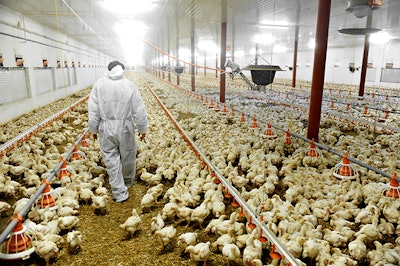
A research team at the University of Georgia is experimenting with a new technique that could one day speed up the vaccination process against infectious bronchitis in poultry.
“What we were trying to do was develop a new technology that we can use to combat infectious bronchitis virus,” said Brian Jordan, Ph.D., Associate Professor, Departments of Population Health and Poultry Science at the University of Georgia.
“The virus itself causes a fairly mild upper respiratory infection in terms of pathogenesis. But it does make the bird more susceptible to secondary bacterial infections.”
An ever-moving target
Infectious bronchitis evolves very rapidly, making control strategies an ever-moving target. New variants or strains of the virus seem to emerge every five to eight years. In order to develop an effective vaccine, researchers have to characterize the strain, attenuate it and go through a lengthy licensing and approval process with the U.S. Department of Agriculture (USDA) and Food and Drug Administration (FDA).
“The virus evolves very rapidly. So, when we develop a vaccine for this virus, it is very effective against that virus. However, every five to eight years, a new strain of the virus seems to emerge,” Jordan explained.
“Because of this, it can be two to three years before a traditional vaccine can be developed when we have these new variants that emerge. We wanted to come up with a different approach that could get something to the producers faster and that cuts down on the lag time between the emergence of a new infectious bronchitis variant and the development of an effective treatment.”
Memory cells and antibody development
The research project evaluated the potential for pseudotyped vesicular stomatitis virus (VSV) particles carrying infectious bronchitis virus spike proteins as a vaccine for emerging strains.
“When you give live vaccines, they typically induce the strongest antibody response, but the antibodies are specific to that particular virus strain. But, if you give a different virus, it will make antibodies to the new virus, but it will also make antibodies to the old virus (the original infection) because of the memory the B cells have. We were trying to see if we could induce the memory B cells in the bird with a non-replication competent virus so that when they were given other vaccines, the memory B cells would also produce antibodies against new types of infectious bronchitis,” he said.
Unfortunately, the project was not successful, but the researchers hope to use the lessons learned to continue to work on finding new ways to develop better vaccination practices and control methods for infectious bronchitis.
“We are still looking at alternative ways to develop potential vaccines to see if we can either streamline vaccine development to shorten that timeline between new variant and vaccine production or maybe even develop a different kind of vaccine that is more broadly protective,” said Jordan.
The project was funded by the U.S. Poultry & Egg Association.
Like what you just read? Sign up now for free to receive the Poultry Future Newsletter.


















